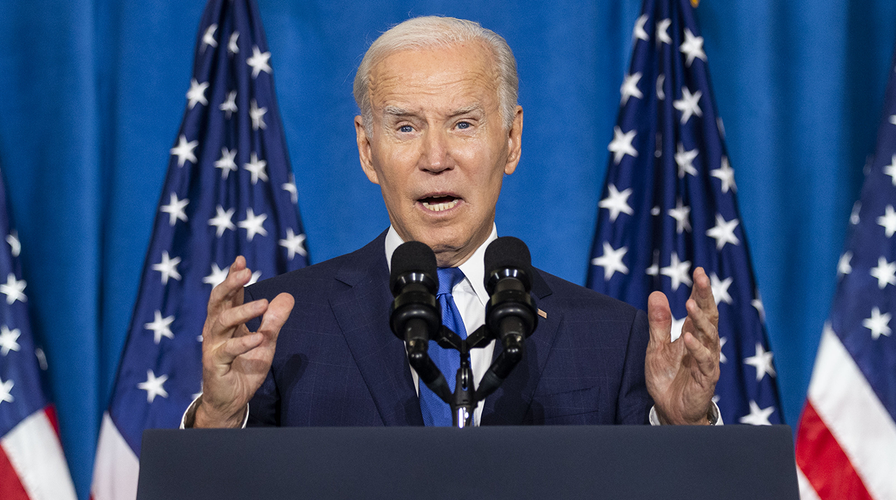WATCH LIVE: President Biden delivers remarks on lowering prescription drug costs and protecting Social Security and Medicare
The Joliet, Illinois, event is part of the president's weekend push before midterm elections.
Americans are scared about retirement. Barely half of working-age Americans believe Social Security will provide them the same benefits that are paid to today’s retirees. More than two-thirds of Americans fear that workers cannot save enough on their own to achieve a secure retirement. After nearly four decades of inaction to fix Social Security’s now-$20 trillion funding shortfall, policymakers should look to our fellow English-speaking countries for inspiration.
These nations, with similar political and economic traditions to our own, provide valuable lessons in forging sustainable retirement programs and building adequate retirement incomes.
Countries around the globe face the same demographic challenges of aging populations. Low birth rates and increased lifespans are squeezing the finances of government retirement programs in nearly every developed country.
Political progressives sometimes look to continental Europe for policy inspiration. In some of those countries, retirement benefits provided by Social Security-like programs comprise the vast majority of retirees’ total incomes. In Luxembourg, for instance, government benefits replace 89 percent of a typical worker’s pre-retirement earnings, well above the 70 percent "replacement rate" that financial planners consider sufficient for retirees to maintain their previous standard of living.
SOCIAL SECURITY NOW ALLOWS INDIVIDUALS TO SELF-SELECT GENDER
But, to put things bluntly, most Americans don’t care how things are done in Luxembourg. Or France, or Germany, or Belgium, or most other continental European countries. Those nations' traditions and roles for government are different from those that most Americans consider right for our own country.
But there is a class of countries that much more closely resemble the U.S., including the U.K., Australia, New Zealand and Canada. Not solely due to linguistic commonality, these Anglo countries are familiar to Americans in how they build the general relationship between citizens, government and the economy.
But on retirement income provision, the other English-speaking countries are forging a different path from the U.S. Even as U.S. progressives advocate for expanding Social Security benefits, most of the other Anglo countries assert a more limited role for government-provided benefits while taking greater steps to increase households’ personal savings for retirement.
The main English-speaking countries all offer a stronger retirement income safety net than the U.S. Australia pays a means-tested benefit set at approximately the U.S. poverty threshold, effectively eliminating poverty in old age. New Zealand offers a universal flat dollar retirement benefit with no means test. The U.K. also offers a flat retirement benefit, but the benefit is scaled based on retirees’ number of years of work. And Canada offers two minimum retirement benefits, one based on years of residence in the country and the other based upon need.
While these Anglo countries pay higher minimum retirement benefits than the U.S., they also pay far less to higher-income retirees. In 2022, the maximum Social Security benefit was $41,206, paid to someone who earned an average of about $130,000 annually over their career. That’s compared to $11,456 per year in New Zealand, $13,150 in Australia, $11,608 in Canada, and just $11,141 in the U.K. Retirement benefits for high earners are simply much more generous in the U.S. than in other English-speaking countries, straining the federal budget to pay benefits for households that can easily afford to save for retirement on their own.
CLICK HERE TO GET THE OPINION NEWSLETTER
But differences in government retirement programs tell only half the story. With the exception of Canada, all the English-speaking countries also do more to encourage retirement savings on top of their government-provided benefits. In Australia, every employee must be enrolled in a retirement plan, to which employers must contribute 10.5 percent of employee pay. In the U.K. and New Zealand, employees are automatically enrolled in supplementary retirement accounts that include an employer matching contribution, though employees may withdraw if they wish. Canada does not yet require or auto-enroll employees into private savings plans.
CLICK HERE TO GET THE FOX NEWS APP
The U.S. Social Security program, under which a high-income couple could retire with more than $80,000 in annual benefits, is an exception in the English-speaking world. Social Security-like programs in other English-speaking countries focus more on preventing poverty in old age, while more strongly encouraging private retirement savings to supplement these core benefits. There is no reason the U.S. cannot follow these other countries’ lead to provide stronger retirement security at lower cost to the taxpayer.



